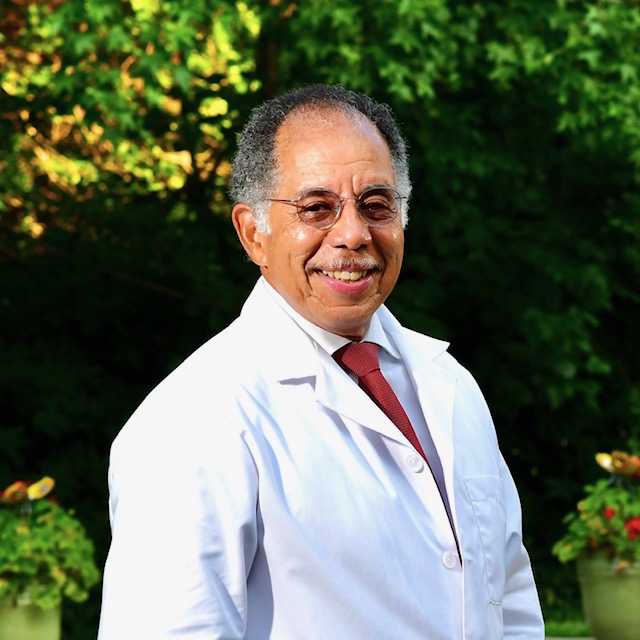Meet MSDC member Howard University alumnus Dr. Edwin Chapman

As a young boy, Dr. Edwin Chapman was shaped by leaders around him, leaders who happened to be his parents.
History has recorded the impact of his father, Joseph Conrad Chapman, Sr. on the African American community. He was the first director of the Urban League of Northwest Indiana, Inc. in 1945.
During his four-year tenure there, he made significant contributions to the city of Gary, Indiana. Under his direction, St. Mary’s Mercy and Methodist Hospitals permitted the use of their facilities by Black physicians. Dr. Martin H. Lovell and Dr. Benjamin Grant were the first African Americans to join the staff thanks to the efforts of Mr. Chapman.
Mr. Chapman helped paved the way for his sons to pursue medical degrees. Dr. Chapman is one of five children. His older brother also practiced medicine and retired at age 83.
Dr. Chapman’s mother also played an influential role in her community as an elementary school teacher for more than thirty years. She thrived helping children learn to read and helped to open the doors to their future.
Throughout his career, Dr. Chapman has worked diligently not only in pursuit of his passion, but also to live up to the expectations set of his parents.
“Growing up in Gary, I was well aware of the civil rights movement but was not directly involved with it even though my father, Joseph Chapman, Sr., was deeply immersed in racial issues as the first executive director of the Gary Urban League. He entered that position in 1945 facing both a strike, where white students refused to attend schools with Black students, as well as a hospital system that would not allow qualified Black physicians on staff. Through the Urban League, he was able to work with the leadership of the schools, churches, hospitals, U.S. Steel, and the Gary Post Tribune to negotiate solutions to both problems with the amiable integration of the schools and hospitals by 1947. Both of my parents were professional educators, but very pragmatic as activists, and as a result I did not experience any personal conflicts as a young man in Gary,” shared Dr. Chapman.
After high school, Dr. Chapman followed his oldest brother, Dr. Joseph Chapman, Jr. and enrolled in Howard University in Washington, D.C. in as an undergraduate in 1964, followed by Howard University College of Medicine in 1969. “D.C. wasn’t as cosmopolitan as a New York or Boston,” said Dr. Chapman. “The neighborhood was structured in a way that felt similar to Gary. I was comfortable living on campus and being in the surrounding community,” he added.
With his path towards medicine well marked, Dr. Chapman selected his internal medicine specialty based on his interests. “I am a problem solver and internal medicine is like solving problems. It is a little bit like being a medical investigator,” he said.
His interest in solving problems served as one of his greatest assets as his worked evolved over the years.
While working as the medical director for a new methadone clinic in the early 2000s, he was amazed at what he saw. “It became clear to me that so-called toxic stress was a major driver of addiction in the African American community,” he said. He began to see the need to merge primary care and substance use disorder treatment in the same facility with the help of on-site mental health services. “Our African American patient population was suffering from anxiety, depression, racism, among other things. They were self-medicating their problems. We needed to start treating the whole person,” he said.
Ward 6 is the theatre where the opioid epidemic battles rage and Dr. Chapman has taken the helm to rally his colleagues to join him in the fight. Armed with lab coats, knowledge, and passion, he has been a mainstay in the ward for over four decades, dedicated to combating addiction disorders through mental health treatment.
For Dr. Chapman, the correlation is clear, “Mental health and substance use disorder are parallel issues. Due to stigma in the patient population that I work with, people feel abandoned by both society and their families. We need to address this as community wide collaborative issue rather than an individual problem.”
For those with insurance, Dr. Chapman has observed some success; however, working to improve insurance coverage for social services and peer support services is another obstacle Dr. Chapman is willing to take on. “We need to change the payment system so that payment is provided for these essential support services as a part of the medical setting including social workers and people with lived experiences: advocacy, housing, transportation, employment, as well as an empathic ear. Social Determinants of Health are just as important as state-of-the-art medications.”
To maintain his own health and wellbeing to tackle such daunting obstacles, Dr. Chapman enjoys his personal time. “Medicine is my passion, but I recognize the need to maintain my own mental health. That means spending time watching sporting events, concerts, plays, movies, and a good meal with family and friends.”
He and his wife, a retired RN, who left retirement to help administer COVID vaccines, have two have two grown children and two grandsons.
Dr. Chapman joined MSDC after a meeting with the Executive Vice President, Robert Hay. As an MSDC member, Dr. Chapman has gained a platform to champion physicians to become leaders in the D.C. opioid epidemic. “I was very impressed with Robert and his dedication to physician advocacy. MSDC orchestrates positive changes for patients and physicians that we can't possibly achieve without structured collaboration.”
Do you know a physician who should be profiled in the MSDC Spotlight Series? Submit a nomination to Robert Hay at
hay@msdc.org, for a future story. MSDC membership is encouraged for featured physicians.



Leave a comment